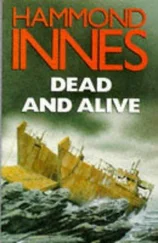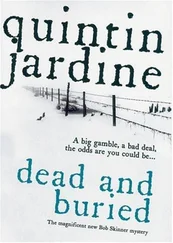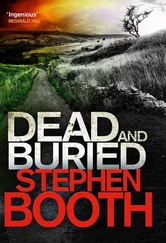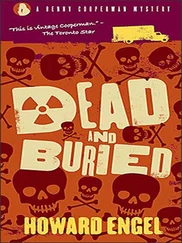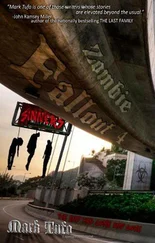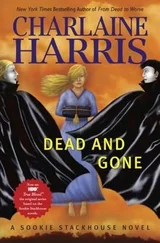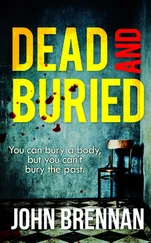Andrew Vachss - Dead and Gone
Здесь есть возможность читать онлайн «Andrew Vachss - Dead and Gone» весь текст электронной книги совершенно бесплатно (целиком полную версию без сокращений). В некоторых случаях можно слушать аудио, скачать через торрент в формате fb2 и присутствует краткое содержание. Жанр: Старинная литература, на английском языке. Описание произведения, (предисловие) а так же отзывы посетителей доступны на портале библиотеки ЛибКат.
- Название:Dead and Gone
- Автор:
- Жанр:
- Год:неизвестен
- ISBN:нет данных
- Рейтинг книги:5 / 5. Голосов: 1
-
Избранное:Добавить в избранное
- Отзывы:
-
Ваша оценка:
- 100
- 1
- 2
- 3
- 4
- 5
Dead and Gone: краткое содержание, описание и аннотация
Предлагаем к чтению аннотацию, описание, краткое содержание или предисловие (зависит от того, что написал сам автор книги «Dead and Gone»). Если вы не нашли необходимую информацию о книге — напишите в комментариях, мы постараемся отыскать её.
Dead and Gone — читать онлайн бесплатно полную книгу (весь текст) целиком
Ниже представлен текст книги, разбитый по страницам. Система сохранения места последней прочитанной страницы, позволяет с удобством читать онлайн бесплатно книгу «Dead and Gone», без необходимости каждый раз заново искать на чём Вы остановились. Поставьте закладку, и сможете в любой момент перейти на страницу, на которой закончили чтение.
Интервал:
Закладка:
I already knew where it was—in a forensics lab being vacuumed for evidence to help them put me back where they knew I belonged. Or in an NYPD evidence locker, waiting to nail the coffin they were building for me. But I kept my face blank and confused, watching him leave.
It took him about an hour to return. “Apparently, there’s some sort of rules for a person who was … assaulted. The police—”
“But what do I do ?” I asked him, depression leadening my voice. “I have to get dressed sometime , don’t I? I mean, if I’m ever going to get better? So I can find my—”
“Of course you do,” he said. He was trying to be soothing, but I could feel the anger beneath the surface. He was in the right profession, caring for other people. I wondered how long he’d last, working next to people who didn’t.
“This … thing,” I said, plucking at the hospital gown. “It’s embarrassing to walk around in. Even if I just had a pair of pants, I could maybe …”
“I’ll find you something,” he said.
The next night, Rich gave me two pairs of light-green, bleached-out pants with a drawstring instead of belt loops. I knew where they must have come from. When I told him I didn’t know how to thank him, I was telling the truth.
About one in the morning, the hospital floor was nearly as dead as some of its patients. I started my walk. A janitor with a huge square bucket on wheels stuffed with spray bottles of cleanser shuffled past, not looking up. The nurses’ station nearest my end was quiet—only two of them, absorbed in conversation. One glanced my way for a second. Curiosity, not concern.
After all those weeks of shuffling by, I had every room in the corridor catalogued. I knew what I needed, but it was still a crapshoot. I was completely unconnected from the machines by then, but I still pulled the morphine pump along with me. You’d have to be real close to see the tubes were loose and dangling under my hospital gown.
I told myself, if it didn’t work tonight, then tomorrow night. No panic. Breathed slow, through my nose, shallow and steady.
The first room I wanted was a four-patient unit. I slipped inside. Machines made their noises. Somebody was asleep, breathing through an oxygen mask. I parted the curtain, found the call button for the nurses’ station, and hit it a couple of times. Then I stepped to the door, looked back. All clear.
I moved again, quick now, all the way around to the other side of the corridor, shielded by the bank of elevators. Found the other room I wanted. A private room. Young man inside. Life-support systems kept him from crossing over. The room was empty, but his closet wasn’t. I grabbed a red pullover, a denim jacket, and a pair of fancy basketball sneakers. Stepped over to his door. Peeked out. It was as empty as before. Maybe one of the nurses had responded to the call button, maybe not. I was betting they’d take their time, the way they always had with me.
I walked to the staff elevator, still dragging the morphine pump, the stolen stuff bundled under my other arm. Hit the switch. Heard the motors engage. Waited.
The car was empty. I stepped inside, hit the button for the first floor, shoved the morphine machine into the far corner and draped the hospital gown over it. Then I stepped into the sneakers, slipped on the pullover, and put my arms into the denim jacket.
When the doors opened on the first floor, there were a lot of people moving around. A pair of interns brushed past me, impatient to get somewhere. But no cops—if they were on watch, they’d be on the other side, at the visitors’ entrance.
I stepped into the crowd, followed the signs to the ER. Nobody paid the slightest attention to me as I walked through that frantic, noisy, bloody mess and continued right on through to the exit.
A couple of bluecoats were standing outside, smoking. They gave me cops’ glances. I didn’t look at them, just limped away, the bandages around my head all the evidence they’d need that I’d just been “treated and released.”
As soon as I turned the first corner, I realized I wasn’t in the Bronx. I could see the FDR in the distance, so I was in Manhattan, on the East Side. A wave of panic welled up inside me. A setup? Would they be waiting? I breathed deep through my nose, steadied myself. If it was a trap, they’d be watching—I had to keep playing my role.
My hands were shaking. My fingers wouldn’t work right. I couldn’t tie the damn sneakers, and I was afraid of tripping. I sat on the curb and pulled the laces out. The sneakers were too big—they flopped when I walked, and I had to move slow, arching my feet deeply to keep from losing them.
But I had to move. I could make a collect call, but the cops might know about the pay phones at Mama’s. I could call the Mole—his number was off their radar—but the cops would be checking every pay phone around the hospital once they found out I was gone. It wouldn’t take a computer long to run all the numbers within a certain time frame, and that could open doors the Man never knew even existed.
All right. No calls. And going to Mama’s was out. The Mole’s junkyard was in the Bronx. The Prof and Clarence cribbed in Brooklyn. Michelle changed hotels like she changed hairstyles. All too far to go unless I could bum some change for the subway. And at way past midnight, I didn’t like my chances.
I kept moving east, toward the river. Under the FDR, there’d be all kinds of places to hide. From the cops, anyway.
But I was weaker than I’d thought. Every step was slow. I passed a homeless man, asleep in a doorway. Maybe I could just find a spot like that, become part of the landscape.…
I knew what that meant, those kinds of thoughts coming. Just another way of going to sleep in a snowbank. After a while, you’re not cold anymore.
I stopped walking. Leaned against a building, my hands auto-groping for a pack of cigarettes that wasn’t there. Okay, the street signs were coming into focus. I knew where I was. And that I wouldn’t survive the night outdoors. Only one way to go, then. I about-faced and headed west, toward Park Avenue.
The Thirty-third Street subway was deserted. No clerk in the token booth. I slipped under the turnstile, grunting with the pain. Made my way down to the platform, found a bench. A young couple were on the next bench over, still party-blissed, not in a hurry.
Time passed. I was alive in every nerve ending, but I didn’t have much left in my tank. If a roving wolfpack of teenagers decided to have some fun with the bum, I wouldn’t be able to stop them. And if the cops were close by, if they had an alert out to Transit, I’d have to keep faking it. Tell them some story about “going home” to … I don’t remember.
The downtown No. 6 finally pulled in. I shuffled aboard. The car was about half full. I wanted to keep away from people, but I needed to sit down, too. I was still making up my mind when a woman who looked like she worked till midnight cleaning offices got up. I took her seat. I wanted to thank her, but her face told me why she got up—she figured I must come with a smell to match my looks, and she didn’t want any part of that.
The train let me out at Canal and Lafayette. Plenty of people; plenty of traffic, too. I couldn’t tell if anyone was paying attention. I started my walk.
Chinatown runs twenty-four/seven, but most of the activity isn’t on the streets once the tourists clear out. And I was close enough to a batch of different homeless camps so that I didn’t get a second glance as I shuffled along, watching as close as I could to see if I had company.
The way you signal Max’s dojo is to push the bell for the warehouse loading bay three times, fast. A light flashes in Max’s place, on the top floors. He’s deaf. If he’s around, the side door will click open. You step into murk, even in daylight, but Max can see you from the landing.
Читать дальшеИнтервал:
Закладка:
Похожие книги на «Dead and Gone»
Представляем Вашему вниманию похожие книги на «Dead and Gone» списком для выбора. Мы отобрали схожую по названию и смыслу литературу в надежде предоставить читателям больше вариантов отыскать новые, интересные, ещё непрочитанные произведения.
Обсуждение, отзывы о книге «Dead and Gone» и просто собственные мнения читателей. Оставьте ваши комментарии, напишите, что Вы думаете о произведении, его смысле или главных героях. Укажите что конкретно понравилось, а что нет, и почему Вы так считаете.

